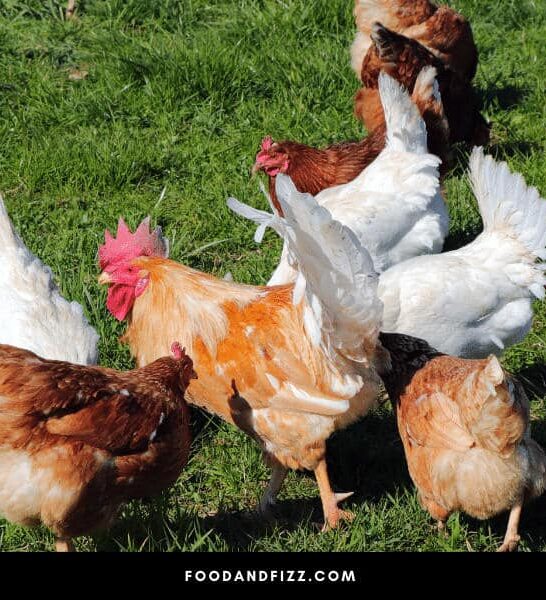What is the difference between rooster vs. cock and hen vs. chicken? Many years ago, as I traveled in the land of the Brits, or as you might more commonly know the place, Britain, I visited London Zoo. I was somewhat disappointed, as not only was it much like other zoos but, also considerably smaller than I’d imagined.
For some reason, I’d expected great things from a place called “London Zoo,” but nope, not sure the juice was worth the squeeze, as they say. Still, it was many years ago–nearly two decades now–so maybe things have changed.
Anyway, I was at London Zoo and came across a curious pen. The obligatory wire fence surrounded it, and inside were some chickens, as confirmed by a sign which said, “Chickens.”
For a minute or two, I tried my darndest to figure out the joke (we all know about British humor, right 🙄), but I didn’t get it. Luckily, a zoo staff member stood nearby, watching me as intently as I looked at the exhibit.
“Chickens?” I asked. “Chickens??”
She instantly understood my confusion.
“Lots of these youngsters have never seen a real-life chicken before,” she explained. “All they ever see are chicken parts in the freezer or on a plate.”
As weird as that may seem to anyone who, like me, was brought up in a relatively rural area with plenty of experience of various farm animals and lots of wildlife (I guess a privileged upbringing in its own way), the only experience many folks have of this popular fowl is gastronomic.
It is, therefore, of little surprise that we are unfamiliar with various terms for the bird, words with which any country-living individual would be as familiar as a city-dweller with, er… city stuff.
What Is The Difference Between “Rooster” vs. “Cock” and “Hen” vs. “Chicken”?
Chicken refers to a species of bird and any adult member of that species, male or female. Roosters and cocks are male chickens, but roosters are sexually mature, while cocks are sexually immature. A hen is a female chicken.
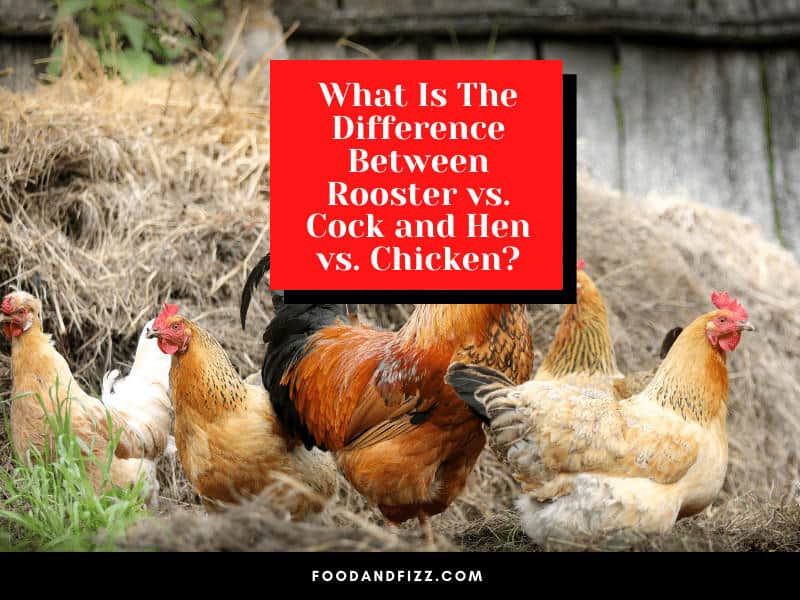
Say Hello to My Little Friend, The Chicken
“Chicken” is the name for the bird when we refer to the species, as in, “Has anyone ever tried crossing chickens with turkeys?” (Actually, they have, and the result is a decidedly odd-looking bird that creeps me out.
If you are interested, a chicken father and turkey mother make a “churk,” while a turkey father and a chicken mother make a “turkin.”)
In general, though, we hardly ever mean the species when we say “chicken,” meaning the bird, not “chicken,” meaning coward. Instead, we mean adult birds of the chicken species. This sets chickens apart from “chicks,” which is the word for immature chickens (“immature” meaning young, not “immature” meaning silly).
Chicken: a species of bird, but also a non-gendered term for adult members of the species
Chick: specifically, young chickens.
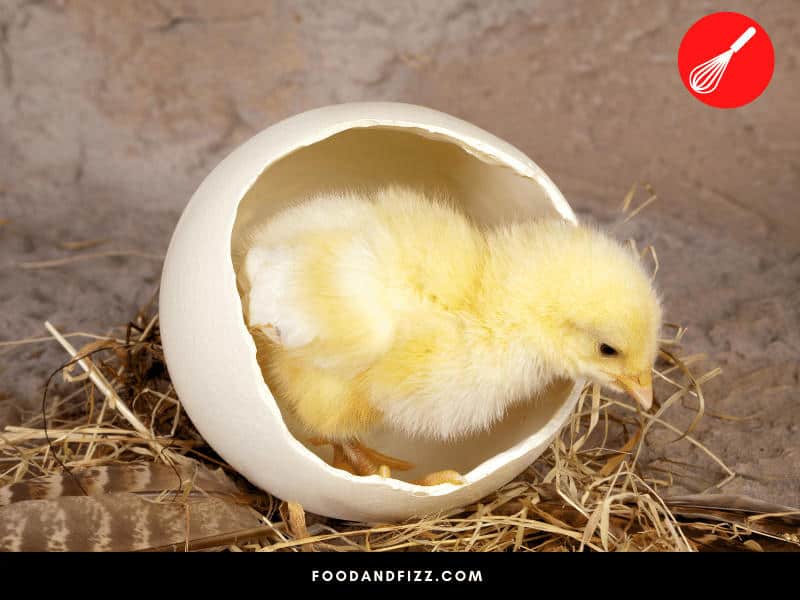
“King” of the Roost, aka, “Rooster”
Chicken is a non-gendered term that refers to male and female chickens, but “rooster” refers only to male chickens.
Roosters are feisty, testosterone-driven, no-nonsense characters who rule their roost with an iron hand, well, claw, I suppose is the right word.
If you think of a plenipotentiary Middle East ruler such as a sheik, sultan, or emir, I’m sure you have the word “harem” floating around in the back of your mind.
As commonly espoused in our more fanciful literature, a harem is where a bevy of beauties are locked up in what is essentially a gilded cage for the sole pleasure of the ruler. Well, the chicken equivalent of a harem is a roost, and the chicken equivalent of the sheik is the rooster.
A rooster is incredibly territorial, waking up early to blast an unsubtle warning to all other potential rivals that this land is his, and he will suffer no adult male visitors (that is why we hear them crowing at daybreak and at various times during the day).
As you might imagine, roosters aren’t terribly big on feminism and will keep their females in line with a no-nonsense attitude that involves dispensing furious violence on violators of the peace.
However, many poultry farmers keep all-female batteries, although they run the risk of hierarchical problems in which cliques form and bullying occurs (there’s a reason we say “henpecked”). In these conditions, outcast members of the group can be bullied to death.
Roost (n, v): a group of chickens which, in the wild, would consist of one adult male and several females, their chicks and adolescents. “Roost” is also where roosts settle down for the night. However, “roost” is also a verb meaning “to sleep in the roost.” Thus, this versatile word is both a noun and a verb.
Rooster: the adult male who rules the roost and has sexual rights over the adult females. I’m not sure how chickens prevent or handle incest, though.
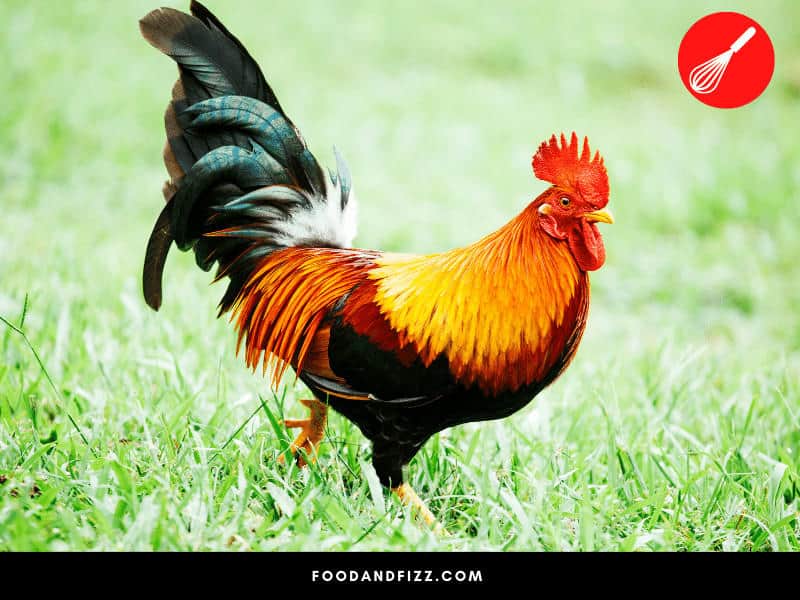
Cocky Cockerels
A cock is a male chicken, but he is no rooster. Cocks are young males, and the “correct” term for them is “cockerel.”
Cocks are tolerated by the rooster until they get too big for their breeches and start getting, ahem, cocky, at which time there will have to be a showdown to determine who will rule the roost.
Cock: a young male chicken that has yet to reach sexual maturity. Older than a chick. Not as old as a rooster.
Cockerel: the same as a cock. The “proper” word for a young male chicken. It may be proper, but it’d be bizarre to run around on a farm in Missouri saying “cockerel” all the time.
Broody Hens
Female chickens also have their own term too. “Hens” are sexually mature female chickens. Hens are the chickens that lay eggs and, in nature, brood on the eggs until the eggs hatch.
Broody hens are the estrogen-driven mirror of testosterone-driven roosters. In the case of broody hens, they get all tetchy, sullen, and irresponsive, using surprisingly intimidating “growls” and puffing up their feathers when approached.
Hens will brood on eggs until the eggs hatch, so it is a good idea to ensure that either (a) the eggs are fertile–i.e., there’s a rooster around to keep up the good work–or (b) put the broody hen into a “brood breaker”–a specially designed coop that is a lot like a solitary prison cell.
While using a brood breaker may seem cruel and unusual, broodiness is peculiar in that it can be a social malaise that spreads throughout the battery, leading to results that aren’t fun. I don’t know whether broodiness can spread to “pullets” (sexually immature female chickens).
Hen: sexually mature female chicken. Does the heavy lifting of laying eggs and helping to hatch chicks.
Pullet: sexually immature female chicken.
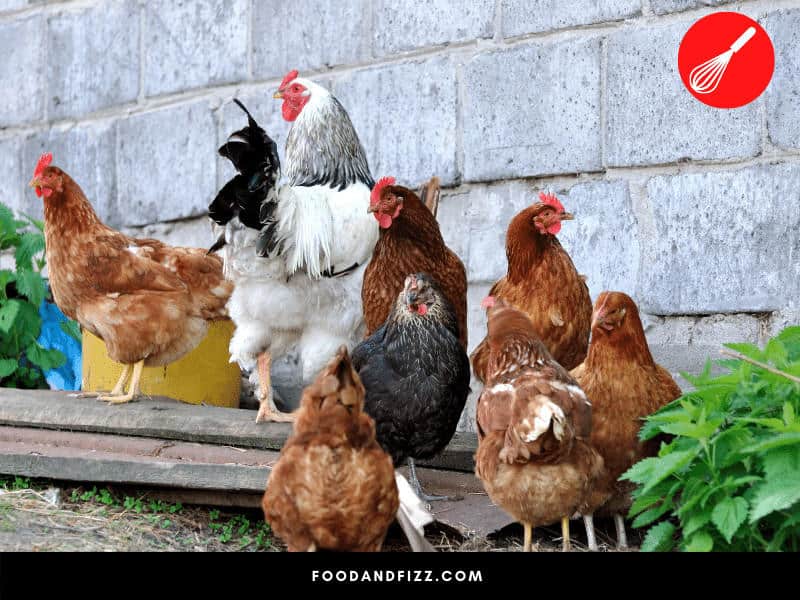
Brood (n, v): (noun) A hen’s clutch of chicks. Some also mean the hen and the chicks, but I’d rather you didn’t. Be better than that! (verb) to sit on eggs to hatch them.
Also, to be broody: meaning, to be cranky, irritable, and withdrawn. (Boy, in years past, I would have showered you with a whole bunch of jokes about this, but in this day and age, we seem to have lost our sense of humor, so I’ll just shut up if that’s okay.)
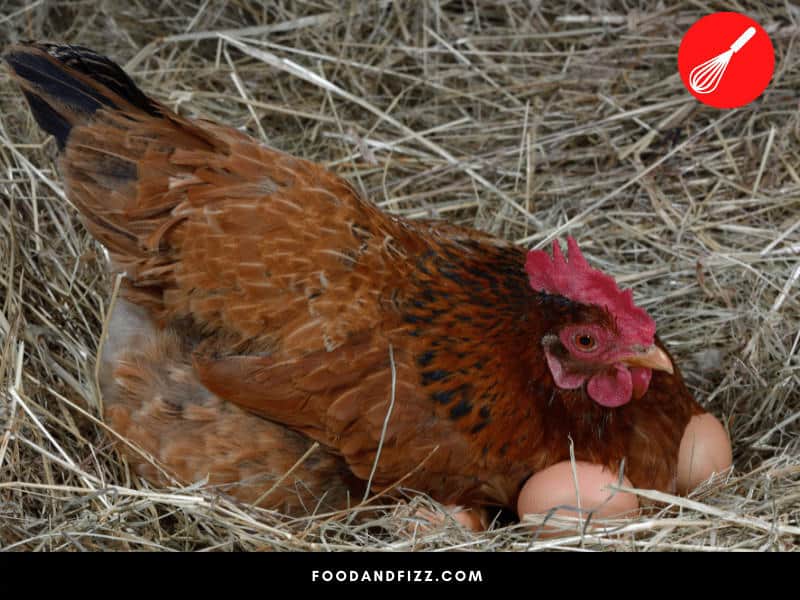
Frequently Asked Questions on What Is The Difference Between “Rooster” vs. “Cock” and “Hen” vs. “Chicken”?
What is The Difference Between a Hen and a Chicken?
A chicken refers to a species of bird and any adult member of that species. Hens refer to sexually mature female chickens. All hens are chickens but not all chickens are hens.
What is a Rooster?
A rooster is an adult male chicken who rules the roost and has sexual rights over adult female chickens.
What is the Difference Between a Cock and a Hen?
A hen is a sexually mature female chicken responsible for laying and brooding eggs. A cock is a young male chicken that has yet to reach sexual immaturity. It is older than a chick but younger than a rooster.

